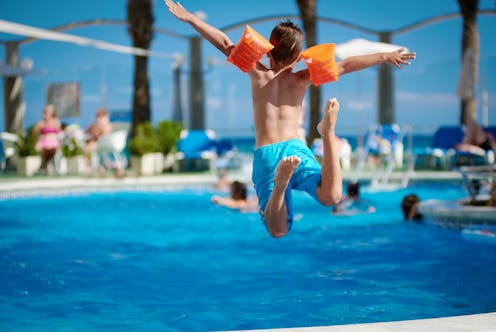Life
That Chlorine “Smell” From A Pool Actually Means Something Super Gross

The smell of chlorine can be a nostalgic one. It's sort of sickly, but also smells distinctively like summertime. But, apparently, the smell of chlorine in a pool isn't the smell of chlorine, but the smell of poop, pee, sweat, and more mixed with chlorine. Surprise!
As reported by Delish, the Centers of Disease Control and Prevention recently posted some information about swimming pools and chloramines, which are chemical irritants formed when chlorine mixes with various other things on people's bodies like sweat, urine, feces, makeup, deodorant, and anything else that might be on a human. The post on the CDC website is titled, "Chemical Irritation of the Eyes and Lungs" and dramatically subtitled, "Red eyes or irritated nose or throat after swimming? Blame the pee, poop, and sweat!"
Basically, if you smell what you generally think of as chlorine smell, you are actually smelling chloramines. Chloramines are bad because of the health issues they can cause and also because the water has less chlorine left to kill germs. According to the CDC, a "healthy pool" shouldn't have a strong chemical smell. (If you're thinking right now that every pool you've ever gone to has had a strong chemical smell, you're not alone.)
The CDC explains that chloramines can exist in the water and also in the air surrounding the pool. This is even more of an issue with indoor pools than outdoor ones, because there's less ventilation. Chloramines can lead to "respiratory symptoms such as nasal irritation, coughing, and wheezing" and "asthma attacks can be triggered in people who have asthma" — this goes for anyone at the pool area, not just swimmers. As for swimmers actually in the water, chloramines can cause itchy, red eyes and skin irritation and rashes. (If you're thinking right now that you thought itchy, red eyes were just a normal part of swimming in a chlorinated public pool, you're not alone.)
So, what can be done about this? Well, people could stop peeing in pools, for one. The CDC explains that swimmers should be sure to go to the bathroom before going in the water, not swim if they have diarrhea, and that kids should take bathroom breaks and babies should have their diapers checked regularly. Wearing a swimming cap can also help reduce chloramines, and rinsing off before getting in the pool is very important as the CDC notes "Rinsing off in the shower for just 1 minute removes most of the dirt or anything else on your body."
The CDC also suggests people talk to others about chloramines and tell pool staff if they see poop in the water (hopefully, that's obvious), if they smell a chemical smell, or if they experience eye, skin, or respiratory irritation.
In addition to the information about chloramines, the CDC has a ton of other info on the Healthy Swimming section of its site, including fun stuff like facts about other illnesses and germs. While reading about how to not put diarrhea in a pool and how to not get diarrhea from a pool isn't the most enjoyable thing, it is important that adults and kids alike take precautions when swimming. Everyone has to share that pool water, so don't be selfish. And just go pee in the bathroom, please.
This article was originally published on